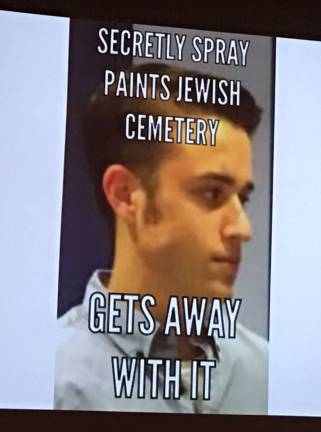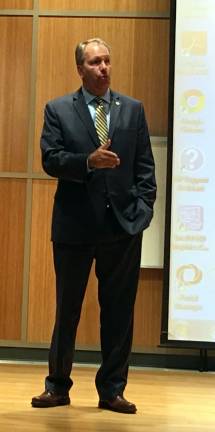Orange County responds to increase in hate crimes


BY ERIKA NORTON
GOSHEN — While investigating the anti-Semitic vandalism at Temple Beth Shalom cemetery in Warwick that rocked the community two years ago, Orange County District Attorney David Hoovler said he recognized a need for education and training to combat hate crime in the county.
“We realized we were seeing sort of a spike or an uptick in not the incidents themselves, but more rhetoric, more symbols, more signs involving hate speech and potentially hate crime,” Hoovler said.
He also said they found that a lot of the county’s younger generation did not have a complete understanding of hate speech — what it is and what certain symbols mean.
In response, the county partnered with the Greater Jewish Federation of Orange County and the Anti-Defamation League to hold a seminar last week where local law enforcement, school administrators and the legal community learned how to identify, investigate and prosecute hate crimes in the county.
‘Double impact’Amy Feinman, the Northeast Regional Counsel for the Anti-Defamation League, explained to attendees about how hate crimes have a “double impact,” affecting a whole community, not just the victims.
“We often refer to hate crimes as message crimes,” Feinman said. “Not only do they affect the victim, but they are intended to send a message to an entire community."
That, she added "stokes fear and distrust in the community.”
Hate crimes are also often times exceptionally brutal, with hate crimes twice as likely to cause physical injury to a victim and four times as likely to lead to hospitalization.
Senior Assistant District Attorney David Byrne talked about the difference between hate speech and hate crime.
Byrne said that under New York State law, while citizens cannot be required to approve of the beliefs and practices of others, they must never commit criminal acts on account of them.
The line is between free speech content and speech with a criminal purpose.
“It doesn’t prohibit you from having these beliefs or perceptions, as repugnant as those beliefs or perceptions are," Byrne said, "but the law does prohibit you from acting on those beliefs or perceptions if your actions specify a specified offense.”
Byrne said hate crimes are unique in that evidence is needed to prove the defendant was motivated by their beliefs or perceptions about the victim, such as hate speech they said while committing the crime, the extreme nature of the crime, social media posts or hateful organization memberships or tattoos.
Breaking the Warwick cemetery caseWhen prosecuting the Warwick cemetery case, Senior Assistant District Attorney Kerry Kolek said investigators tried to think outside the box, using numerous warrants for computers, cell tower records and Facebook accounts, as well as polygraphs.
Through the warrants, Kolek said investigators found the defendant had asked other people to delete texts between them about the incident.
They also found an internet meme that had been created using Microsoft Paint on someone’s computer the morning after the cemetery was desecrated and before police were even alerted to the incident.
The image read: “secretly spray paints Jewish cemetery, gets away with it.”
Prosecutors used all this evidence to charge the defendant with conspiracy to commit criminal mischief as a hate crime and tampering with evidence.
Public campaign, hotlineThe district attorney’s office has also launched a campaign to educate students about how to prevent hate speech, with posters reading “speak up to stand up to hate” now being hung up in school hallways and municipal buildings throughout the county.
Hoovler encouraged residents to report any hate they experience or encounter to their newly created hate crime hotline at 800-378-1411.